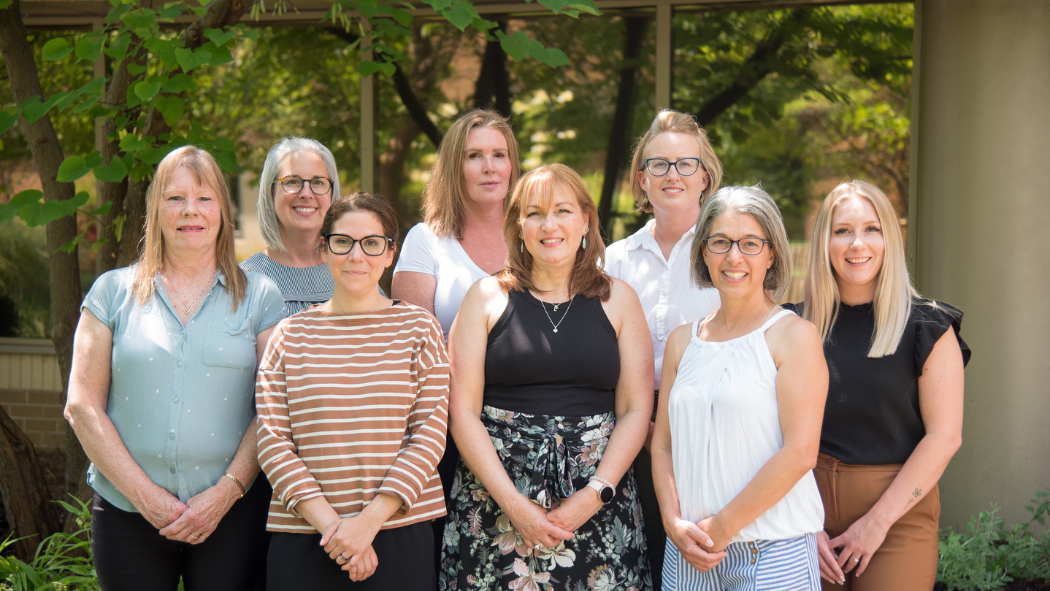
July 29, 2024
The Oncology Patient Navigation Program (OPNP) is operated by the South West Regional Cancer Program (SWRCP) and supports patients with navigation through the cancer system from pre-diagnosis, through treatment and, if necessary, the initial palliative care phase.
OPNP is available for patients in Ontario’s south west region and can be accessed by a direct referral to the South West Regional Cancer Program at London Health Sciences Centre (LHSC). This program is a fully virtual department where patients and staff connect through phone calls. Patients are supported through phone assessments and provided with education throughout their time in the program.
The program consists of four patient navigators that help navigate patients through the cancer care system, and four intake clerks who are the central hub for referrals. The intake clerks complete patient registrations, give information to patients about diagnostic imaging appointments including dates and details, as well as helping to facilitate return appointments to the Most Responsible Physician within a timely manner.
Amy Kraft, Oncology Patient Navigator in OPNP says, “The OPNP program supports patients and their families going through a challenging experience and helps patients navigate through the cancer system from the time of referral, which can be before an official cancer diagnosis. During this emotional time patients can call and reach out for answers, clarification and support.
The OPNP staff help complete clinical assessments of patients, review the patient’s signs and symptoms and organize testing (e.g., diagnostic imaging and blood work) with the patient and their caregivers. Some other key navigation supports OPNP staff provide include:
- Determining priority for patient testing and follow-up as required.
- Alerting physicians to critical results.
- Providing patients with direct contact information with the OPNP team.
- Advocating for patient concerns and issues.
- Liaising with groups, departments, disciplines and organizations at the local and regional levels.
- Engaging in collaborative problem solving and planning strategies to resolve identified service gaps or delays.
The OPNP program helps to provide patients with timely access to diagnostics closer to home which leads to a timelier diagnosis.
“OPNP has provided tremendous support for patients. In a health care system that at times can be fragmented, they can be the bridge to ensure patient care occurs as smoothly and efficiently as possible. Many patients have commented on how the OPNP program has been helpful in their journey,” says Dr. Michael Ott, Department Head, Oncology, LHSC.
“When working with a patient, if diagnostic imaging is needed such as a CT scan or MRI, we look at diagnostic imaging departments within the region,” explains Kraft. “If someone lives in Kincardine, we can organize scans in Kincardine, Owen Sound or Walkerton so they do not need to travel as far.”
The success within the referral to diagnosis process has allowed OPNP to increase the number of cancer disease sites that the program supports. Currently, OPNP helps support patients diagnosed with cancers in the lung, pancreas, rectum, liver, head and neck, colon, gallbladder and biliary tract, anus, esophagus and peritoneal cancer. Since each diagnosis has different criteria, the OPNP staff can help navigate the specific next steps required.
Patient navigation is an important aspect of quality improvement for patients, for example, through supporting patients’ navigation, OPNP captures important data across the system.
“Through data collection, OPNP captures a wide range of information that helps to identify service gaps. That data is then used to explore solutions that benefit those using our service” Kraft says.
Dr. Ott notes how OPNP already helps fill some gaps and creates a one-stop connection for patients. “Prior to OPNP patients at times were left to navigate the system independently. The OPNP team also helps to streamline investigations ensuring we maximize regional resources and provide investigations or care in the most timely fashion.”
OPNP was launched in 2010-2011 with a mission to:
- Provide a high standard of care to all suspected cancer patients, in a fair and equitable manner;
- Ensure limited delays to patient care, at the right time, to the correct service;
- Ensure seamless transition to most appropriate care provider;
- Partner with regional hospitals to limit diagnostic delays.
A patient can be referred by a physician or nurse practitioner to OPNP through multiple avenues including from their primary care provider, through a visit to the Emergency Department, urgent care centre or other specialty services.
Photo of OPNP team above. Back row left to right: Amy Kraft, Oncology Patient Navigator; Dawn MacKay, Intake Clerk; Jennifer Beal, Oncology Patient Navigator. Front row left to right: Karen Duncan, Intake Clerk; Mariana Mustapic, Intake Clerk; Laurel Batzold, Intake Clerk; Raquel Clawson, Oncology Patient Navigator; Darby Martin, Oncology Patient Navigator.